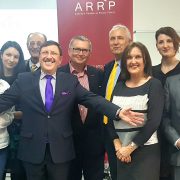ICCO and Romanian PR Association establish cooperation
ICCO and the Romanian PR Association (ARRP) have decided to develop professional relations at a meeting between ICCO President Maxim Behar and the Romanian Association Board in Bucharest. Behar met the President of the Association Gabriel Paslaru, as well as his deputies Camelia Spataru, Catalin Hosu and Laura Constantin and made a presentation in front of more than 50 local PR professionals on modern PR and social media influence.
Maxim Behar said: “It is a great honor to meet for the first time my Romanian colleagues. I can say that they are very experienced and knowledgeable professionals and the market is very well developed. The meetings I had in Bucharest made me think that the Romanian PR Association will be a valuable ICCO partner and member and for sure this will be a very valuable win-win cooperation.”
Gabriel Palsaru said: “We are very glad that we had fruitful meetings with Mr. Behar and they encouraged us that our partnership with ICCO will be very beneficial for our members. We will discuss in our Board potential application for full membership in ICCO and hope it will increase the level of PR business in Romania, give us access to the best expertise in the modern business and opportunities to, in turn, share our knowledge with professionals from all over the world.”
During his visit, the ICCO President was also received in the Cotroceni Presidential Palace by the spokesperson of the Romanian President, Mrs. Madalina Dobrovolschi and presented to her the latest ICCO achievements as leading global PR organisation.
About ARRP:
Founded in 1995, the Romanian Public Relations Association was created to build stronger the family of communicators in Romania. Today, it brings together both seasoned specialists who set the foundations of the profession in this country, and young professionals in the early stages of their careers. Since 2012, ARRP started to expand by inviting in its membership not just individual communicators, but also communication agencies and departments within companies, convinced that in so doing it grows more powerful and the interests of its members are served better.





